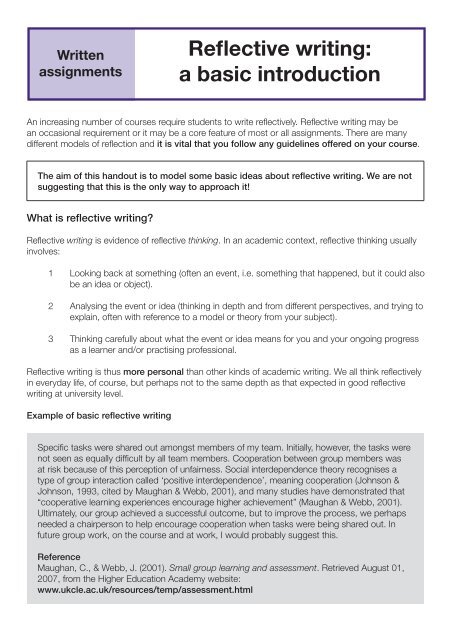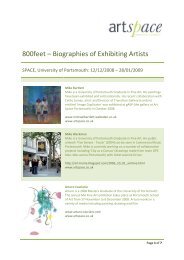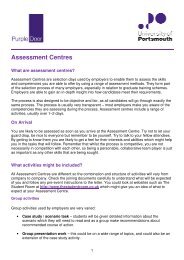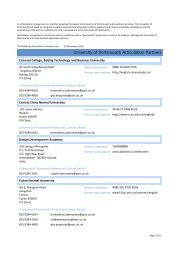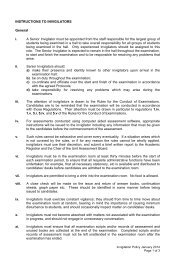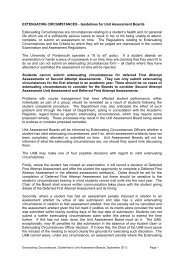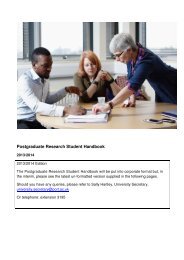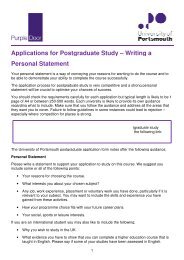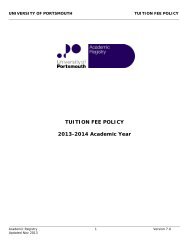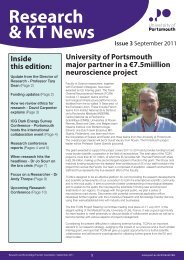WA13a - Reflective writing: a basic introduction
WA13a - Reflective writing: a basic introduction
WA13a - Reflective writing: a basic introduction
You also want an ePaper? Increase the reach of your titles
YUMPU automatically turns print PDFs into web optimized ePapers that Google loves.
Written<br />
assignments<br />
An increasing number of courses require students to write reflectively. <strong>Reflective</strong> <strong>writing</strong> may be<br />
an occasional requirement or it may be a core feature of most or all assignments. There are many<br />
different models of reflection and it is vital that you follow any guidelines offered on your course.<br />
The aim of this handout is to model some <strong>basic</strong> ideas about reflective <strong>writing</strong>. We are not<br />
suggesting that this is the only way to approach it!<br />
What is reflective <strong>writing</strong>?<br />
<strong>Reflective</strong> <strong>writing</strong> is evidence of reflective thinking. In an academic context, reflective thinking usually<br />
involves:<br />
1 Looking back at something (often an event, i.e. something that happened, but it could also<br />
be an idea or object).<br />
2 Analysing the event or idea (thinking in depth and from different perspectives, and trying to<br />
explain, often with reference to a model or theory from your subject).<br />
3 Thinking carefully about what the event or idea means for you and your ongoing progress<br />
as a learner and/or practising professional.<br />
<strong>Reflective</strong> <strong>writing</strong> is thus more personal than other kinds of academic <strong>writing</strong>. We all think reflectively<br />
in everyday life, of course, but perhaps not to the same depth as that expected in good reflective<br />
<strong>writing</strong> at university level.<br />
Example of <strong>basic</strong> reflective <strong>writing</strong><br />
<strong>Reflective</strong> <strong>writing</strong>:<br />
a <strong>basic</strong> <strong>introduction</strong><br />
Specific tasks were shared out amongst members of my team. Initially, however, the tasks were<br />
not seen as equally difficult by all team members. Cooperation between group members was<br />
at risk because of this perception of unfairness. Social interdependence theory recognises a<br />
type of group interaction called ‘positive interdependence’, meaning cooperation (Johnson &<br />
Johnson, 1993, cited by Maughan & Webb, 2001), and many studies have demonstrated that<br />
“cooperative learning experiences encourage higher achievement” (Maughan & Webb, 2001).<br />
Ultimately, our group achieved a successful outcome, but to improve the process, we perhaps<br />
needed a chairperson to help encourage cooperation when tasks were being shared out. In<br />
future group work, on the course and at work, I would probably suggest this.<br />
Reference<br />
Maughan, C., & Webb, J. (2001). Small group learning and assessment. Retrieved August 01,<br />
2007, from the Higher Education Academy website:<br />
www.ukcle.ac.uk/resources/temp/assessment.html
A possible structure for reflective <strong>writing</strong><br />
<strong>Reflective</strong> thinking – especially if done in discussion with others – can be very ‘free’ and unstructured<br />
and still be very useful. Even reflective <strong>writing</strong> can be unstructured, for example when it is done in a<br />
personal diary. In assignments that require reflective <strong>writing</strong>, however, tutors normally expect<br />
to see carefully-structured <strong>writing</strong>.<br />
The example of <strong>basic</strong> reflective <strong>writing</strong> on the previous page can be broken down into three parts:<br />
description, interpretation and outcome.<br />
1 Description (keep this bit short!)<br />
What happened?<br />
What is being examined?<br />
2 Interpretation<br />
What is most important / interesting<br />
/ useful / relevant about the object,<br />
event or idea?<br />
How can it be explained e.g. with<br />
theory?<br />
How is it similar to and different from<br />
others?<br />
3 Outcome<br />
What have I learned from this?<br />
What does this mean for my future?<br />
Specific tasks were shared out amongst members of my team.<br />
Initially, however, the tasks were not seen as equally difficult by<br />
all team members.<br />
Cooperation between group members was at risk because<br />
of this perception of unfairness. Social interdependence<br />
theory recognises a type of group interaction called ‘positive<br />
interdependence’, meaning cooperation (Johnson & Johnson,<br />
1993, cited by Maughan & Webb, 2001), and many studies<br />
have demonstrated that “cooperative learning experiences<br />
encourage higher achievement” (Maughan & Webb, 2001).<br />
Ultimately, our group achieved a successful outcome, but to<br />
improve our achievement, we perhaps needed a chairperson<br />
to help encourage cooperation when tasks were being shared<br />
out. In future group work (on the course and at work), I would<br />
probably suggest this.<br />
This is just one way of structuring reflective <strong>writing</strong>. There are others and you may be required to<br />
follow a particular model. Whichever approach to reflection you use, however, try to bear in mind the<br />
following four key points (all of which were made by course tutors who set and mark reflective work):<br />
• Reflection is an exploration and an explanation of events – not just a description of them.<br />
• Genuinely reflective <strong>writing</strong> often involves ‘revealing’ anxieties, errors and weaknesses, as<br />
well as strengths and successes. This is fine (in fact it’s often essential!), as long as you show<br />
some understanding of possible causes, and explain how you plan to improve.<br />
• It is normally necessary to select just the most significant parts of the event or idea on which<br />
you’re reflecting. (The next page has some suggestions on how to do this in your <strong>writing</strong>.) If<br />
you try to ‘tell the whole story’ you’re likely to use up your words on description rather than<br />
interpretation.<br />
• It is often useful to ‘reflect forward’ to the future as well as ‘reflecting back’ on the past.
Vocabulary aid<br />
The following are just a few suggestions for words and phrases that might be useful in reflective<br />
<strong>writing</strong>. Using any of these words and phrases will not in itself make you a good reflective writer, of<br />
course! The vocabulary aid is structured according to the three-part analysis that is modelled on the<br />
previous page of this handout.<br />
1 Description (the short bit!)<br />
We are not suggesting specific vocabulary for any descriptive elements of your reflective <strong>writing</strong>, because<br />
the range of possible events, ideas or objects on which you might be required to reflect is so great.<br />
Do remember, though, that if describing an idea, for example a theory or model, it is usually best to<br />
use the present tense e.g. ‘Social interdependence theory recognises…’ (not ‘recognised’).<br />
Events, of course, are nearly always described using the past tense.<br />
2 Interpretation (probably the most important bit)<br />
⎧<br />
⎪<br />
⎨<br />
⎪<br />
⎩<br />
⎧<br />
⎪<br />
⎨<br />
⎪<br />
⎩<br />
aspect(s)<br />
element(s)<br />
meaningful experience(s) was (were)…<br />
significant issue(s)<br />
For me, the [most] important idea(s)<br />
Previously,<br />
[Alternatively,]<br />
[Equally,]<br />
relevant<br />
useful arose from…<br />
⎫<br />
⎪<br />
⎬<br />
⎪<br />
⎭<br />
⎧<br />
⎪<br />
⎧<br />
⎨<br />
⎩<br />
learning happened when…<br />
At first knew (did not know)...<br />
I ⎨<br />
Initially, noticed (did not notice)...<br />
⎪<br />
⎩<br />
thought (did not think)...<br />
At the time, felt (did not feel)...<br />
Subsequently, questioned (did not question)...<br />
Later, realised (did not realise)...<br />
This<br />
This<br />
might be<br />
⎧<br />
⎨<br />
⎩<br />
⎧ is similar to...<br />
⎨<br />
⎩ is unlike...<br />
⎧<br />
⎨<br />
⎩<br />
resulted from…<br />
because of…<br />
is perhaps due to…<br />
could be explained by…<br />
is probably related to…<br />
because…<br />
⎧ reveals…<br />
[Un]Like... this ⎨⎩<br />
demonstrates…
3 Outcome<br />
Having<br />
read...<br />
⎧<br />
⎪<br />
⎨<br />
⎪<br />
⎩<br />
applied... realise…<br />
I now ⎨<br />
discussed... wonder…<br />
Martin Hampton<br />
email: academicskills@port.ac.uk<br />
www.port.ac.uk/ask<br />
<strong>WA13a</strong>: 08/10<br />
⎧<br />
⎪<br />
⎪<br />
⎩<br />
feel…<br />
experienced... think…<br />
analysed... question…<br />
learned... know…<br />
[Additionally,] ⎫ ⎪⎬⎪⎭<br />
[Furthermore,] I have learned that...<br />
[Most importantly,]<br />
I have significantly ⎫⎪⎬⎪<br />
my skills in…<br />
⎧<br />
slightly ⎧<br />
⎨ developed my understanding of…<br />
⎨<br />
⎩ improved my knowledge of…<br />
⎭<br />
⎩<br />
However, I have not [sufficiently] my ability to…<br />
This knowledge ⎧ is ⎧<br />
⎨⎩<br />
⎨⎩<br />
This means that…<br />
This makes me feel…<br />
essential<br />
This understanding could be important<br />
This skill will be useful<br />
Because I<br />
did not...<br />
⎧<br />
⎪<br />
⎨<br />
⎪<br />
⎩<br />
have not yet...<br />
am not yet certain about...<br />
am not yet confident about...<br />
do not yet know...<br />
do not yet understand...<br />
As a next step, I need to…<br />
⎧<br />
⎨ to me as a learner [because…]<br />
⎩ to me as a practitioner [because…]<br />
I will now need to…<br />
DCQE<br />
Department for Curriculum<br />
and Quality Enhancement


